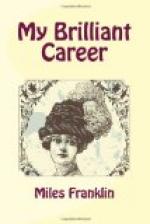Frank Hawden and I parted good friends. I leant out and waved my handkerchief, until a bend of the road hid him from sight.
It was noon, the thermometer registered 112 degrees in the shade, and the dust was simply awful. It rose in such thick grey clouds that often it was impossible to discern the team of five which pulled us, and there was danger of colliding with passing vehicles. We were very much crowded, there being sixteen passengers. When we settled down and got started, I discovered that I was the only representative of my sex, and that I was sandwiched between a perky youth in his teens and a Chinaman, while a black fellow and a man with a red beard sat opposite. A member of Parliament, farther up the seat, who had been patronizing New Year’s Day races in a portion of his electorate, bawled loudly to his companion about “the doin’s of the ’Ouse”. In the perky youth I discovered a professional jockey; and when he found that I was a daughter of Dick Melvyn, the one-time great horse-breeder, he became very friendly. He gave me a couple of apples out of his tin box under the seat, from whence he also produced his whip for my inspection, and was good enough to say:
“If you can’t stand the stink of that bloomin’ chow, miss, just change seats with me. I’ve knocked about, so that I can easy stand some tough smells without much inconvenience.”
I cautioned him to talk lower for fear of hurting the Chinaman’s feelings: this amused him immensely. He laughed very much, and, leaning over to the red-bearded man, repeated the joke:
“I say, this young lady is afraid I might hurt the chow’s feelin’s. Golly! Fancy a bloomin’ chow havin’ any!”
The other man also thought it a great joke. I changed seats with the jockey, which put me beside a young gentleman of a literary turn of mind, with whom I had some conversation about books when the dust, rumble of wheels, and turf talk of my other neighbour permitted. They were all very kind to me—gave me fruit, procured me drinks of water, and took turns in nursing a precious hat, for which, on account of the crush, no safe place could be found among the other luggage.
Before we had gone half our journey the horses knocked up. All the men were forced to walk up hills for miles and miles in the dust and heat, which did not conduce to their amiability, and many and caustic were the remarks and jokes made upon the driver. He wore out two whips upon his team, until the labour and excessive heat sent the perspiration rolling in rivulets down his face, leaving muddy tracks in the thick coating of dust there. The jockey assisted with his loaded instrument of trade, some of the passengers thrashed with sticks, and all swore under their breath, while a passing bullock-driver used his whip with such deadly effect, that the sweat which poured off the poor beasts was mingled with blood.
“Why the deuce don’t you have proper horses?” demanded the red-bearded passenger.




